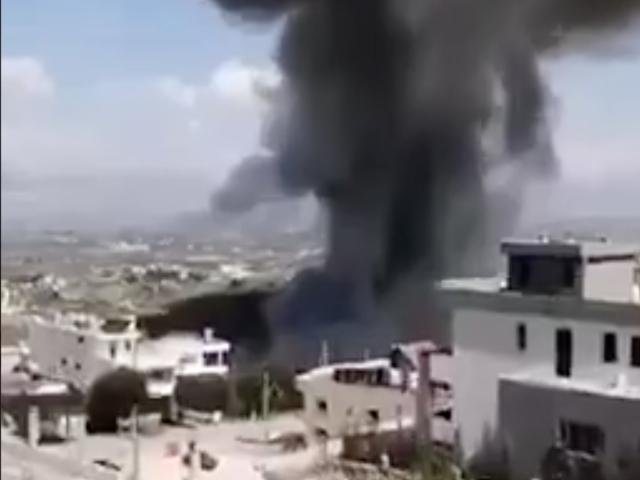Amid the ongoing geopolitical tensions in the Middle East, Israel finds itself at the nexus of escalating conflicts, particularly with Iran and Hezbollah. Recent developments have intensified the situation, with a failed Iranian attack on Nevatim Air Base underscoring the growing threats facing Israel. This article examines the multifaceted dynamics at play, including the potential for imminent combat in Lebanon, as Israeli military leaders assess their next moves in a rapidly evolving security landscape.
The relative quiet in the Gaza Strip has shifted focus to more pressing concerns: the immediate threat from Iran and the interconnected tensions with Hezbollah, which is backed and aligned with Iran. This link with Hamas has been reinforced by Hezbollah's Secretary-General Hassan Nasrallah’s recent declarations, aligning more closely with Gaza’s militant factions. Hezbollah began atacking Israel on October 8th, one day after Hamas launched their brutal assault on Israeli communities. The situation on Israel's Northern border escalated notably last Tuesday, indicating a potential for increased hostilities between Israel and the Lebanese based Shiite terror group.
Initially, the Israeli military leadership acknowledged some operational success by Iran, perceiving it as a strategic victory. However, it has since been reassessed as a significant operational setback for Iran. The ongoing challenge for Israel is leveraging this situation to gain international legitimacy and support on critical issues such as the Rafah crossing, the ongoing hostage situation, and the broader conflict in Lebanon.
🔴ELIMINATED: Commander of Hezbollah’s coastal sector and senior official in several positions of Hezbollah’s military wing, Ismail Yusuf Baz.
— Israel Defense Forces (@IDF) April 16, 2024
Ismail was involved in the promotion and planning of rocket and anti-tank missile launches toward Israel from the coastal area of…
The call for decisive action against Iran is growing louder within Israeli military circles. IDF Chief of Staff, Herzi Halevi, and Air Force Commander, Major General Tomer Bar, have both advocated for a strong response. A key factor underpinning this stance is the thwarted attempt to destroy Israel's Nevatim Air Base, a plot foiled by Israel’s robust air defense systems and international military cooperation.
Defense Minister Yoav Gallant highlighted the effectiveness of Israel's defenses, stating, "The Iranians launched an aggressive assault with over 500 munitions, yet no cruise missile or drone penetrated our airspace, and of the more than 100 surface-to-surface missiles aimed at us, only four reached Israeli soil—thanks to our meticulous preparation and the exceptional performance of the IDF."
While the world spends its time saying Israel should not respond to the Iranian attack.
— David Collier (@mishtal) April 16, 2024
Iran is still firing rockets on Israel via its proxy Hezbollah. These images from moments ago.
We live in such a hypocritical, fact free age.
In what world should Israel just accept this? pic.twitter.com/hEiUPYiFWR
Despite these successes, Israel faces considerable international pressure to restrain its military actions to maintain the support of a broad coalition. U.S. Secretary of State Antony Blinken has specifically urged War Cabinet Minister Benny Gantz to avoid further escalation. Nonetheless, Israel's leadership appears inclined to take more assertive action, though the specifics of these potential military engagements remain under discussion.
Tensions in northern Israel have surged following a series of hostile engagements. After an operation wounded four soldiers from the Golani Reconnaissance Unit, Hezbollah escalated its attacks, launching rockets at IDF bases and deploying explosive drones. In a significant countermove, the IDF targeted and eliminated two senior Hezbollah field commanders in Lebanon, further intensifying the conflict.
#BREAKING: Sirens sound again in northern Israel amid Iran-backed Hezbollah's continuing hostility and violence. https://t.co/6RRz2HgcDd pic.twitter.com/pw0qTEtqXM
— Israel War Room (@IsraelWarRoom) April 17, 2024
One of the commanders, Ismail Yousef Baz, was a key military figure within Hezbollah, responsible for rocket and anti-tank missile operations along the Lebanese coast. His elimination marks a strategic blow to Hezbollah's operational capabilities. Another high-ranking commander, Mohammad Hussein Moustafa Shouri, was also killed. He led the rocket and missile unit of Hezbollah’s elite Radwan force, underscoring Israel’s focused efforts on degrading the group's military effectiveness.
As the situation develops, the potential for an expanded conflict in Lebanon looms, particularly as the hostage negotiation process stalls. This growing likelihood suggests that Israel may soon designate Lebanon as a primary theater of operations, aiming to secure the northern regions before any further escalation.
👇👇
— Omar Abu Layla (@OALD24) April 17, 2024
I say this :
Hezbollah militias have escalated unprecedentedly against Israel since last night. This escalation is by order from Tehran to deter Israel from focusing on retaliating against the Khamenei regime.
Despite this escalation, the number of casualties in Hezbollah…
In conclusion, Israel stands at a critical juncture, balancing the imperative of national security against the complexities of international diplomacy and coalition dynamics. The decisions made in the coming days will significantly influence the regional security landscape, potentially altering the course of the conflict with longstanding adversaries.


